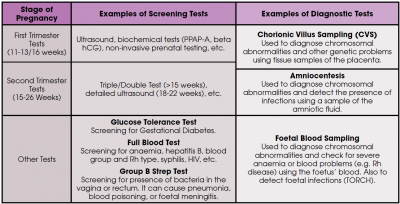Prenatal testing is an important consideration during pregnancy that allows parents to monitor the health and condition of their baby throughout all stages of pregnancy.
What is prenatal testing?
Prenatal testing encompasses two components: screening and diagnostic tests. Screening tests refers to testing a baby’s relative risk of having common birth conditions like Down Syndrome, Patau Syndrome, Edward Syndrome, etc. Diagnostic tests on the other hand, function to confirm the presence of a particular condition in a baby.
When should it be done?
- Screening tests. Primarily done during the first and second trimesters. Additional tests are also available, which are carried out in the third trimester.
- Diagnostic tests. Only performed if initial screening tests indicate a high risk, or if the ultrasound detects abnormalities.

Why is prenatal testing important?
- Helps to monitor the health of the fetus and detects any potential issues (e.g. birth defects, genetic problems, etc.).
- Eases any anxiety or concerns that may stem from uncertainty of the foetus’ health.
- If results indicate that the foetus has a birth condition, it allows for early diagnosis and parents can make early informed decisions and treatment plans.
- For parents who know they have certain inherited disease traits, such testing allows for future planning and help in making decisions about various aspects of family life.
What to do after receiving the results?
No matter the results, it is important to keep in mind that no test is 100% accurate. Consult with your doctor about your test results and what they mean. For certain genetic conditions, consulting with a genetic counsellor may also be beneficial to help prepare for the future.
Prenatal testing is important to monitor the development and general health of your baby throughout all stages of pregnancy. To learn more, speak to your family doctor about prenatal testing during pregnancy.







Comments